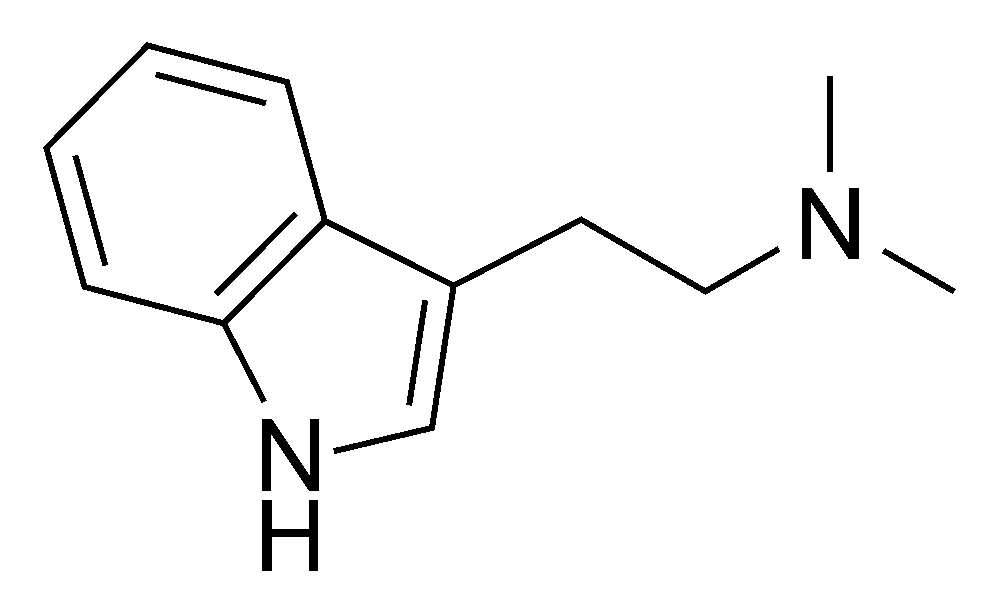N,N-Dimethyltryptamine
| Dimethyltryptamine (DMT) | |
|---|---|
| Chemical name | 2-(1H-indol-3-yl)- N,N-dimethylethanamine |
| Chemical formula | C12H16N2 |
| Molecular mass | 188.27 g/mol |
| Density | 1.099 g/ml |
| Melting point | 49 °C and 74 °C (two different crystal structures) |
| Boiling point | 160 °C at 0.8 hPa (reduced pressure) |
| CAS number | 61-50-7 |
| SMILES | CN(C)CCC1=CNC2=C1C=CC=C2 |
 | |
| ATC code | ? |
| Bioavailability | ? |
| Metabolism | ? |
| Elimination half life | ? |
| Excretion | Urine |
| Pregnancy category | ? |
| Legal status | ? |
| Delivery | Vaporized, injected, or orally in combination with MAO inhibitors |
Indicated for:
Recreational uses: Unethical uses:
Other uses:
|
Contraindications:
|
Dimethyltryptamine, also known as DMT or N,N-dimethyltryptamine, is a short-acting psychedelic hallucinogenic drug. DMT in pure form is a colorless waxy or crystalline solid that was first chemically synthesized in 1931. DMT also occurs naturally in many species of plants. DMT from plants is used in South American shamanic practices. It is the main active constituents of snuffs like yopo and of the potion ayahuasca.
Hallucinogenic properties
DMT is a very powerful yet short-lasting hallucinogen with a duration of maximal effects for only 10 to 15 minutes. However, the subjective duration is often much longer due to the time distortions caused by the drug and the intensity of the experience. The onset after inhalation is very fast, the effects are felt within a few seconds and the maximal effect are reached within about a minute. Due to its short duration DMT can be taken in relatively high dosages, resulting in often very intense experiences.
DMT is inactive if taken orally and therefore it must be inhaled (by vaporization or smoking) or injected. However, DMT can be rendered orally active when taken in combination with a monoamine oxidase inhibitor (MAOI) which also greatly increases the duration of the effect. This is the combination found in the shamanic potion ayahuasca.
Chemistry
DMT is a derivative of tryptamine with two additional methyl groups at the amine nitrogen atom. DMT is often synthesized by the Speeter-Anthony synthesis from indole using oxalyl chloride, dimethylamine, and lithium aluminum hydride as reagents. DMT is usually used in its base form, but it is more stable as a salt, e.g. as a fumarate. In contrast to DMT base its salts are soluble in water. DMT in solution degrades relatively fast and should be stored protected from air and light in a freezer.
Speculations
As DMT is naturally secreted by the human pineal gland, it is believed to play a role in dreaming, near-death experiences and other mystical states. It has been speculated by the researcher Jace Callaway that DMT might be is connected with visual dreaming.
Interesting non-scientific writers on DMT include Terence McKenna and Jeremy Narby, though many people treat their writings with skepticism. McKenna writes of his experiences with DMT in which he encounters entities he describes as "Self-Transforming Machine Elves". Other users report visitation from external intelligences attempting to impart information. These Machine Elf experiences are said to be shared by many DMT users. From a researcher's perspective, perhaps best known is Rick Strassman's The Spirit Molecule (ISBN 0892819278).
Legal status
United States
DMT is classified in the United States as a Schedule I drug.
In December of 2004, the Supreme Court lifted a stay thereby allowing the Brazil-based O Centro Espirita Beneficiente Uniao do Vegetal church to use hoasca tea (containg DMT) in their Christmas services this year. The Supreme Court will likely hear the case and make a final ruling in the spring of 2005.
Canada
DMT is classified in Canada as a Schedule III drug.
UK
DMT is classified in the United Kingdom as a Schedule I/Class A drug.
Brazil
In Brazil there are a number of religious movements based on the use of Ayahuasca, usually in an animistic context that may be shamanistic or, more often, mixed with Christian imagery.
External links
- Vaults of Erowid - DMT
- TiHKAL - DMT
- Spirit Plants
- "Release The Reality" - Web Journal: DMT & Ayahuasca info
- Breaking Open the Head - A shamanic journey into the heart of the psychedelic experience
Brazilian ayahuasca churches
- Santo Daime (in Portuguese)
- União do Vegetal (in English)